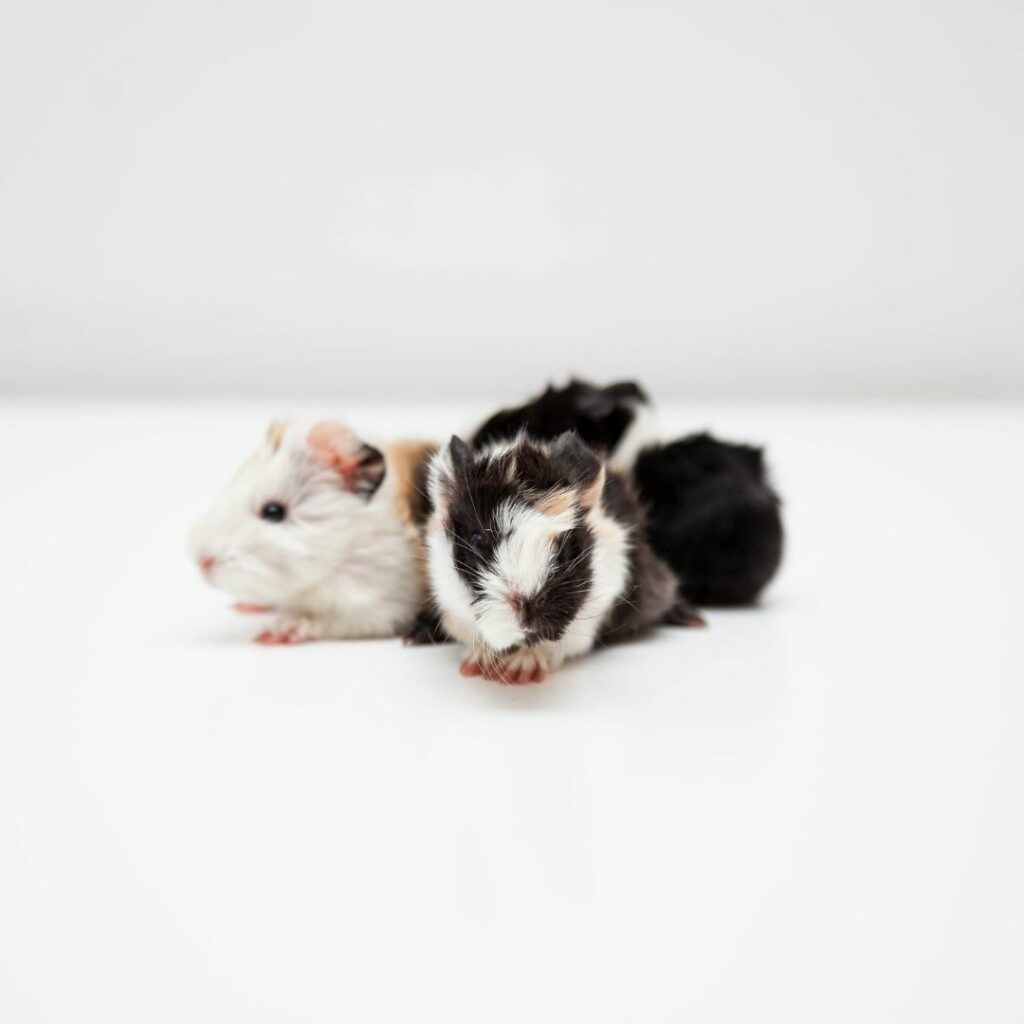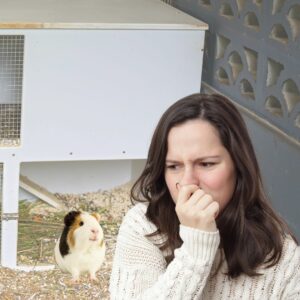Guinea pigs are caring and protective parents.
- They are attentive to their young: Mother guinea pigs will spend a lot of time with their babies, grooming them, feeding them, and protecting them from harm.
- They provide their young with the necessary care for survival: Mother guinea pigs will provide their young with food, water, shelter, and warmth.
- They teach their young important social skills: Mother guinea pigs will teach their young how to interact with other guinea pigs, how to find food, and how to avoid predators.
But then why do guinea pigs eat their babies?
Cannibalism, while it rarely happens with guinea pigs, can be a disturbing and upsetting experience for piggy owners. But this is their instinctive behavior – a survival mechanism.
In this guide, I’ll help you understand the reasons behind this behavior and list prevention tactics to help you ensure the well-being of your beloved pets.
Table of Contents
Why Do Guinea Pigs Eat Their Babies?
There are several reasons why guinea pigs might eat their babies:
Mother is trying to protect her other offspring from predators
Guinea pigs are prey animals, and they are naturally protective of their young. Eating a dead or dying baby can help to remove the scent of the dead animal, which could attract predators.
Mother is trying to conserve energy
Raising babies is a lot of work, and mothers need to eat a lot more food to produce milk.
If the mother isn’t getting enough food, she may eat one of her babies to conserve enough energy for the other babies.
Limited Food Source
When guinea pigs face a shortage of food, particularly during pregnancy and nursing periods, they might resort to eating their own offspring. This behavior is an instinctual response to ensure the survival of the mother and the remaining young.
But this is more likely to happen in the wild, where resources can be scarce. Even though it’s not common for domesticated piggies, it’s critical to maintain a consistent and nutritionally balanced diet for yours guinea pigs to prevent such happenings.
Their diet should content plenty of:
- Vegetables (especially greens)
- Fruit
- Timothy hay
- Orchard hay
- Pellets
- Water
Deceased Guinea Pig Baby
In some cases, an adult guinea pig may consume its deceased offspring. A lot of experts believe that this is a necessary, instinctual behavior to remove any potential threat of attracting predators through the scent of a lifeless pup.
It can also be a way for the mother to clean up the nesting area and eliminate any perceived danger to the remaining piggies.
If you have any pups, don’t forget to regularly check on them to ensure their well-being.
Stress
Guinea pigs, like many animals, are sensitive to stress. And sometimes, a stressful situations can cause a lot of pressure and lead to filial cannibalism.
Some of the most common stressors for a guinea pig are:
- Loud noises
- Sudden changes in environment
- Sudden movements
- Getting scared
To ensure a calm and safe environment for your piggies to prevent stress-related issues, you can:
- Provide hiding spots in the cage
- Minimize loud disturbances
- Bond with and handle your guinea pigs gently to build trust
- Avoid introducing new animals or making drastic changes to their surroundings during sensitive periods like pregnancy and nursing
Do Guinea Pigs Eat Their Babies If You Touch Them?

One of the popular myths when it comes to cannibalism among pets, especially rodents like guinea pigs, is that they eat their young ones if humans touch them. But that’s not true.
Guinea pig mothers, sows, won’t reject their pups and eat them if you touch them. In fact, some guinea pig enthusiast believe that handling the pups can soothe the mother because she will recognize your scent on her babies.
Guinea Pigs Breeding
Guinea pig breeding can be fatal for female piggies (sows) and , especially if not supervised by an expert. Approximately after nine months of their lifespan, the female guinea pig’s pelvic bones start to fuse and it becomes extremely dangerous for babies to going through the birth canal.
Reminder: Make sure to avoid guinea pig breeding or, if you’re interested, visit and consult your veterinarian for professional help.
If you have a pair of piggies with a different gender, you should be prepared for guinea pig babies. But keep in mind that even though it’s not common, there are some extra measures to take to prevent you grown guinea pigs from eating the pups.
To get better insight into breeding and reproduction of guinea pigs, here are some of the important pointers to keep in mind:
- Individual piggy owners, especially with low experience, shouldn’t try breeding their guinea pigs.
- Breeding can shorten the lifespan of female guinea pigs and can be dangerous, especially for first-time mothers over eight months old.
- Spaying or neutering guinea pigs can be a good option to prevent breeding, but only an experienced veterinarian should do it.
- Boars mature sexually as early as two to three months old, and sows as early as two months old.
- The gestation period for guinea pigs is aproximatelly 59-72 days, and they can have up to 5 litters per year on average.
Do Guinea Pigs Eat Their Babies In the Wild?
The simple answer is yes – unfortunately, guinea pigs eat their babies in the wild. In the wilderness, where resources are scarce and guinea pigs are exposed to much more stress, filial cannibalism is a more common situation.
As prey animals, piggies in the wild are constantly exposed to dangers and are trying to survive. Behavior such as filial cannibalism is often one of the mandatory ways for their survival.
Do Male Guinea Pigs Eat Their Babies?
Yes, male guinea pigs eat their babies. But keep in mind that filial cannibalism is more common among piggies who live in the wild.
Male guinea pigs are not typically involved in raising their young. In fact, they may even pose a danger to the babies, as they have been known to eat them. This is why it is important to separate the male guinea pig from the female and babies as soon as possible after birth.
If you are concerned about your male guinea pig eating his babies, there are a few things you can do to prevent this from happening:
- Separate the male guinea pig from the female and babies as soon as possible after birth.
- Make sure the female guinea pig has a quiet and safe place to raise her babies.
- Provide the female guinea pig with a healthy diet and plenty of fresh water.
- Monitor the situation closely and intervene if necessary.
How to Prevent Cannibalism in Guinea Pigs

There are a few things that you can do to help prevent cannibalism in guinea pigs:
- Make sure that the mother is getting enough food and water.
- Provide her with a quiet and safe place to give birth and raise her babies.
- Avoid handling the babies too much, as this can stress the mother.
And, if you notice that the mother is eating one of her babies, remove the baby from the cage immediately.
If you are concerned about cannibalism in your guinea pigs, talk to your veterinarian. They can help you to determine the cause of the problem and recommend solutions.
In addition to the information above, here are some additional tips for preventing cannibalism in guinea pigs:
- Choose a healthy and well-adjusted mother pig.
- Provide a spacious and comfortable cage for the mother and her babies.
- Avoid loud noises and sudden movements around the cage.
- Monitor the mother and her babies closely for signs of stress.
- Separate the mother and her babies if necessary.
By following these tips, you can help to create a safe and healthy environment for your guinea pigs and reduce the risk of cannibalism.
How To Care For Guinea Pig Pups?
Newborn guinea pigs are born fully-formed, meaning they can see, run, and eat solid food within a few days after birth. But it’s important to note that they’ll still rely on their mother’s milk for about first three weeks, and then transition to the regular diet.
They’re much more sensitive and need to grow stronger, so it’s critical to avoid handling them immediately. Once you notice your pups are more active and ready to eat, typically about two to three weeks, early handling will help them bond and become comfortable with you picking them up.
Here are some of the most effective ways to keep your piggies healthy and safe when having guinea pig babies:
- Provide hiding spots: Guinea pigs like the dark – they love to hide and relax in cozy places. So try to introduce hiding spots like a small tunnel or a hidey hut in the baby section – and don’t forget some for adult piggies too!
- Keep an eye on feeding times: Although it’s not that common, some adult male animals may see the newborns as an obstacle when it comes to food. So, make sure there’s no food fight going on.
Try to feed the adult boars and babies at different times. This will minimize the chance of the boars getting possessive about the food and trying to hurt the babies.
- Group dynamics matter: Guinea pigs have a pecking order. Introduce new members carefully, and observe how they interact. If there’s bullying or aggressive behavior, you might need to rearrange the living situation. Compatibility is key to a peaceful guinea pig neighborhood.
- Regular grooming and extra care: Some guinea pig breeds require grooming more often and can be a bit more difficult to maintain.
For example, long-hair breeds can get their fur messy easily. And hairless breeds barely have any fur, hence the name, so they often feel colder than other piggies.
- Regular health checks: Baby guinea pigs are delicate, so keep a close eye on their health. Regularly check for signs of stress, illness, or injuries.
If you spot any issues, visit and consult your vet immediately.
- Separate living spaces: When you’ve got baby piggies in the habitat, try to create a separate living space within the cage as soon as they become less dependent on their mother. This gives the little ones a safer zone to relax in, avoiding the potential filial cannibalism.
Pro tip: You can use a wire mesh to create a low barrier.
My Senior Paws is a participant in the Amazon Services LLC Associates Program, an affiliate advertising program designed to provide a means for sites to earn advertising fees by advertising and linking to Amazon.com. We also participate in other affiliate programs which compensate us for referring traffic.




